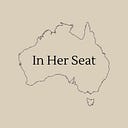Ella Haddad: A progressive focus
“Often individual concerns don’t make headline news, but make a positive difference in the lives of the individual who needed the advocacy.”
Almost 100 years ago, Edith Cowan became the first woman elected to an Australian parliament, in March 1921.
In Her Seat is asking as many currently serving female politicians as we can how they view gender equality, politics and their impact.
This is a non-partisan project that is soliciting contributions from women in all parties, or none at all, in every parliament.
Ella Haddad is the Member for Clark in the Tasmanian Parliament. She was first elected in 2018 and serves as the Shadow Attorney General.
Ella graduated with a law degree and began working for politicians providing legal and policy advice.
Ella left working for politicians to serve in the community and health sectors, including on issues like the stigma and discrimination faced by people accessing drug and alcohol treatment services. During this time she served on the boards of numerous community and health services and peak bodies.
The daughter of a Lebanese migrant and a dairy farmer, Ella is one of the few politicians who has direct experience of being a single parent.
In parliament, Ella has used her skill and knowledge to advance progressive policy, including on issues facing transgender people and health policy.
What does gender equality mean to you?
To me, gender equality is simple: That nobody is treated differently or discriminated against because of their gender.
In practice it means seriously and permanently addressing the structural issues that currently exist to prevent true gender equality in our society.
Which female politicians have inspired or encouraged you?
Judy Jackson is a politician who has inspired and encouraged me. As Attorney General Judy was one of Tasmania’s foremost reformers, achieving lasting progressive law reform.
For example, Judy introduced Tasmania’s Anti-Discrimination Act 1998, which is still Australia’s leading anti-discrimination law. She also introduced Tasmania’s ground-breaking family violence laws which have had a lasting effect, and Tasmania’s Relationships Act which provided legal protection to LGBTIQ+ couples who could not (at the time) yet marry and to any couples who preferred relationships recognition to marriage. She also ignited the campaign for a Tasmanian Human Rights Act.
Judy was a bold reformer and didn’t take no for an answer.
She encouraged me to also fight hard, to stand up for my beliefs and values, and to take strong action to improve lives through progressive policy and law reform.
More recently, I find myself constantly in awe of Jacinda Ardern, whose compassionate, kind approach to leadership should be a model for the world.
What inspired you to serve your community?
Before running for parliament, I worked in the health and community sectors including volunteering on the boards of many Tasmanian community organisations.
I saw first hand how desperately our community needs quality, accessible health and community services and wanted to do everything I could to ensure Tasmanians get the services they need when they need them.
Growing up I saw my mum and dad work incredibly hard in their small businesses and from them I had the values of hard work and community service instilled in me.
They’re the values I took to the work and volunteer roles I had before I ran for parliament and that drive me in this role.
What are the most important contributions you are making in Parliament?
One of the most important roles of a local member is listening to and advocating for the needs of their constituents and community.
Genuinely listening to and acting on concerns is a core responsibility but is also the part of this role that I find most rewarding.
These are often individual concerns and don’t make headline news, but make a positive difference in the lives of the individual who needed the advocacy.
In Parliament, I am most proud of the amendments to the Births Deaths and Marriages Act I moved to remove the requirement for transgender and gender diverse Tasmanians to undergo invasive surgery to have their birth certificate amended.
What is next for gender equality in politics?
Tasmania’s parliament is now fifty per cent women which is great, but there is still a long way to go to change the culture of politics from one of aggression and antagonism to one of negotiation, collegiality and productive change.
While I am optimistic and hopeful, we are definitely on a long pathway to truly alter this dynamic.
Also while Australian parliaments have made positive strides in achieving a better gender balance, we still have a long way to go in other areas of diversity like cultural, religious, sexuality and age diversity.
Ideally, our parliaments should better reflect the demographics of the communities we represent.
In Her Seat interviews can be accessed here
